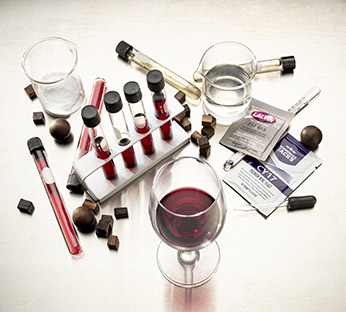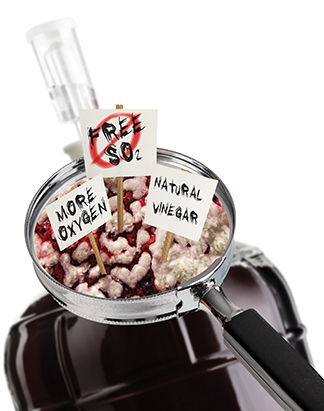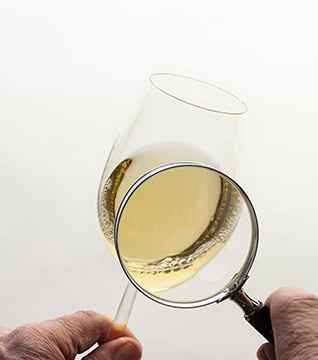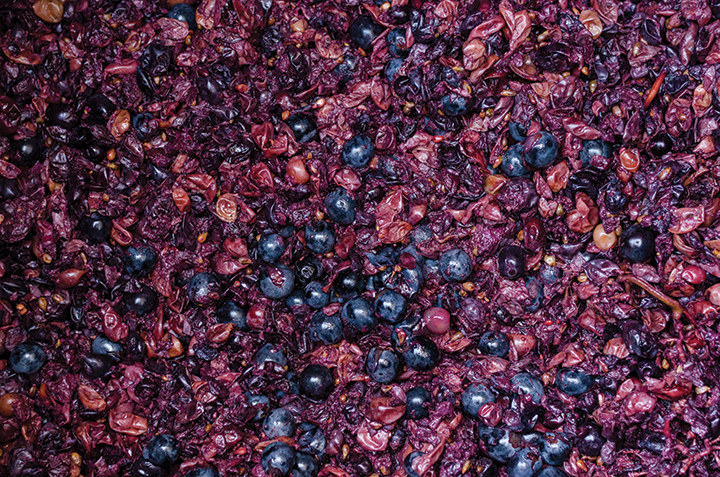We’re Better Together
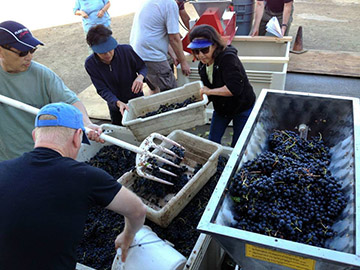
While winemaking can certainly be a great activity on your own, there are many benefits to seeking out and joining an amateur winemaking club. Meeting fellow enthusiastic winemakers not only couples a fun and social element to winemaking, but it can even improve your craft and make you a better winemaker. Clubs offer members valuable learning experiences, advice, and beneficial feedback from other members, and even access to shared equipment or bulk ingredient purchases to help out your budget.
Many clubs put a focus on furthering wine education within the group by inviting guest speakers, distributing newsletters, hosting tastings, doing winery and vineyard visits, offering online resources and presentations on a variety of wine topics. Sharing wine with other members generally means useful feedback on what you’re doing well and areas that could use improvement to help continue to develop your product. It’s also often a space to get guidance and, on the flip side, share your own expertise to help continue to grow the hobby and strengthen your knowledge even more.
Jennifer Jeffries, Central Coast Home Vintners Association (CCHVA) former President and current Vice President of the Board of Directors, believes the biggest benefit of joining a winemaking club is the opportunity to receive advice from the other members. “For home winemaking, there’s always a lot of questions, especially when starting out,” Jeffries says, noting that hobbyists often love to share their own experience and knowledge of the craft.
While the winemaking hobby can be a big investment, there can be a significant cost savings when joining a wine club as well. Since many grape growers sell only in large quantities, a club is often able to buy in bulk and get those grapes at a lower price than if one person were trying to purchase grapes on their own. “We source really high-quality grapes at a reasonable price that you couldn’t do if you were going in alone,” Jeffries explains. The club also buys corks in bulk at a lower price for any members who want to go in on a large purchase.
In addition to the cost savings on grapes and supplies, a club may also allow members to borrow a variety of winemaking equipment. CCHVA, for instance, has a crusher/destemmer, scale, wine press, and other basic equipment that members can use. In some clubs, there may also be an opportunity to purchase equipment second-hand as more seasoned members upgrade their equipment — something that is both cost-effective for all parties and a positive impact on the environment with reusing items and
reducing waste.
As education is a huge component to many clubs, CCHVA hosts events on wine evaluation that includes instruction on faults, a dive into varietals, and even teaches members techniques for judging wine. CCHVA also offers educational opportunities for backyard grape growers, hosting events on how to prune a vineyard and how to protect grapes from pests. Local growers and winemakers have been invited to come in to share their expert insight on winemaking and how they do it at a professional level. The club has also visited vineyards to see a bird netting demonstration along with allowing members to get firsthand experience with a harvest.
Being a part of a wine club can help build confidence, Jeffries says. CCHVA hosts an optional weekly standing Zoom meeting, since not all members live close to each other. Members may discuss how their wine is coming along and ask how to address certain problems that may come up during the process. From techniques to increase the buttery character of Chardonnay, wine analysis equipment recommendations, or shared experiences on the best way to ship wines to competitions are just some of the range of topics that come up.
“It helps those who are struggling to have the confidence and the tools to fix it,” Jeffries says, adding that now you aren’t just trying to navigate it yourself. And on the other side, it gives members an opportunity to share their skills and what they learned in their winemaking experience.
A wine club can also be a great way to dip your toes in the hobby to see if it is something one wishes to continue. CCHVA, for example, welcomes people who haven’t started making wine yet. Before investing in equipment and jumping in, potential new hobbyists can head to a meeting and see what it’s all about for themselves. It’s an opportunity to ask questions, learn more, and determine if it’s a hobby that’s a good fit.
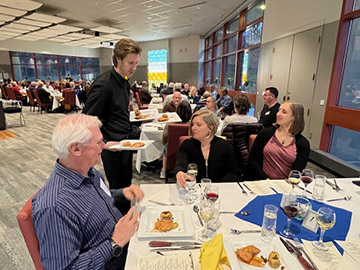
As with most clubs, there is a valuable camaraderie and social aspect to it. Wine clubs often get together for regular meetings, trips to a winery, tastings, wine festivals, wine events and parties, and other social experiences. CCHVA’s annual meeting takes place the Saturday before the Super Bowl, and members bring food and their homemade wine to share. During a summer picnic, the club does a blind tasting while enjoying a barbecue.
While it can be intimidating to join a club, especially as a beginner, most clubs have a variety of skill sets and experience levels. CCHVA has club members who have been making wine for years, while others just started last week. “Come as you are and we will help you do what you want to the level you want,” Jeffries says. In general, most people are thrilled to welcome new winemakers to their meetings and share their passion for winemaking.
A club is a great opportunity to learn from experienced winemakers. “Winemakers are open to share their wisdom with other winemakers,” says Ellen Kareckas, Amateur Winemakers of Ontario (AWO) President.
For this year’s 55th anniversary, AWO invited past members that have since taken their winemaking to the professional level to speak at their event. Some educational seminars included wine tastings, learning technical aspects of winemaking such as additives, utilizing oak and barrels, wine quality and its balance points, viticulture lessons from grape growers, and the history of Ontario winemaking.
At wine club meetings, the group conducts blind tastings with score sheets. “It’s a completely different way of tasting wine,” says Kareckas. “I find you really learn how to appreciate wine at the wine meetings.”
Being a part of the club also gives access to an online forum where members can ask questions on winemaking. Membership to the club allows people to compete in the club’s annual competition, which is a great way to get high-quality evaluation and feedback by trained wine judges.
Deanna Tritz, Corresponding Secretary of the Wisconsin Vintners Association (WVA), says that education is a big benefit for its members.
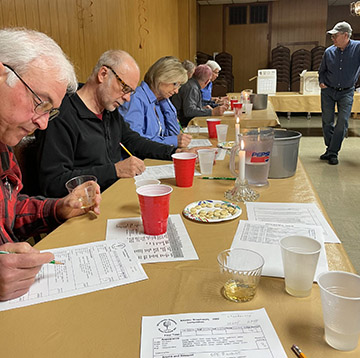
At WVA, wine evaluations are conducted at every meeting. “We encourage people to bring their wines so fellow winemakers can taste them and evaluate,” Tritz says. This means members are receiving valuable and honest feedback on their wines. “We like to think of it not so much of a judging, but an evaluation,” Tritz says.
Tritz adds that it can be very helpful to one’s winemaking to come to the meetings. “There’s nothing like those great conversations; talking about the wines and how we can improve wines,” Tritz says.
While feedback on your wine from your friends and family is nice, it may not always be something you can utilize to make your wine better. Even though it might not always be easy to hear, wine critiques from fellow winemakers are vital to improve your winemaking. Members are able to not only offer their feedback, but often give advice on what could have been done differently and the impact it would have had. And positive feedback from fellow winemakers is great reassurance you’re on the right track. This experience also allows members to learn how to taste wines and fine-tune their own tasting and
evaluation skills.
Many groups often host a variety of speakers to learn from and gain insight. At WVA, the winemaker from Ketcham Estate spoke to the club about making Pinot Noir and some club members even traveled together to visit the Sonoma County vineyard. The owner of Parallel 44 Winery and Vineyard came to talk about his winery, the business side of launching a winery, and winemaking in general. The club has also hosted speakers on identifying and correcting wine faults, and has done demonstrations together on how to make wine. A mentor series with the club allows experienced members to present their knowledge on a particular topic, such as previous experience making Merlot, issues they ran into, what to watch out for, and about Merlot grapes in general.
WVA also provides many social opportunities centered around winemaking, including a dinner dance in winter, a picnic in summer, and a bus tour visiting local wineries. Although people may initially join a club to learn more about wine, often strong relationships are formed. Within WVA, there are members that have become lifelong friends and even travel to other wine and grape growing
areas together.
Being in a group allows WVA to collectively buy grapes in the fall from California, Washington, Oregon, and locally in Wisconsin at a discounted price. The group also buys bulk juice from New York’s Finger Lakes region as well as the West Coast and Europe. In addition to the price benefit, the club also shares the duties of crushing and destemming — techniques made much easier with the help of others.
Buying grapes in bulk is not only cost-efficient but also provides access to high-quality grapes that may not otherwise be available to the solo winemaker. “Good wine starts with good grapes,” says Barb Thomson, Treasurer of Portland Winemakers Club (PWC). “You don’t have to go on your own and try to find where to get good grapes.”
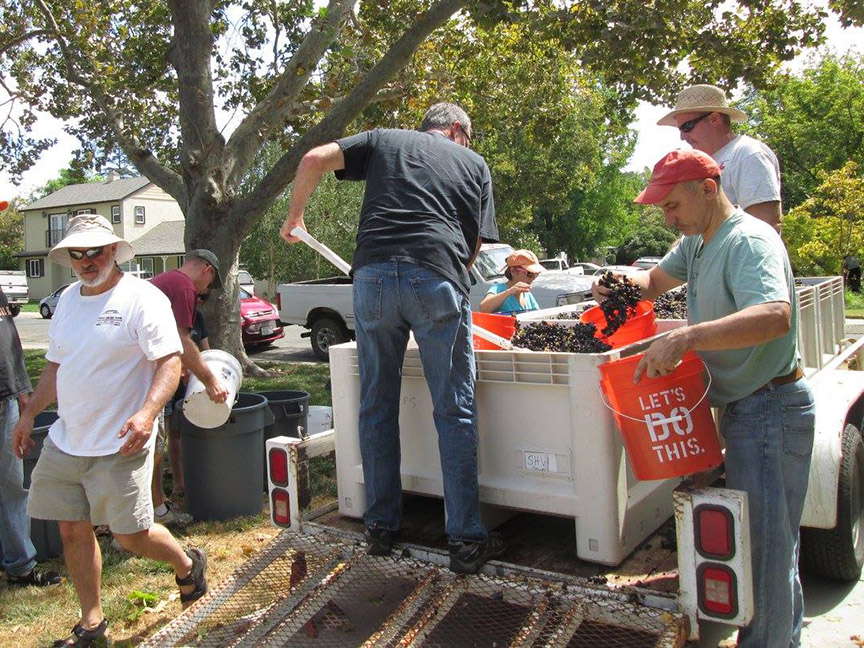
Thomson joined the club to find a good source for grapes, but the club also offered a chance to meet other people with similar interests and build camaraderie and friendships. The club welcomes everyone and includes members who have 30 years of experience and others who have only made a batch or two from kits, to those who haven’t even made their first wine yet.
Club members provide each other feedback at both informal tastings and formal judgings. Thomson points out that tasting other member’s wines besides your own is beneficial in your winemaking. It also helps club members learn to become better at tasting and evaluating wine, including what to look for as far as aroma, clarity, color, flavors, and what typical flaws taste or smell like, Thomson adds.
The club learns from each other’s experiences – how to clean your bottles, different techniques and methods, and how to use equipment. A tips and tricks demo night is a show-and-tell opportunity where members can demonstrate winemaking methods, a new piece of equipment, or how to test for acid in the wine.
A specific member arranges for speakers throughout the year, someone from the industry to talk about vineyard practices, winemaking techniques, or other useful topics. Another member arranges group tours to a winery or vineyard in the area. Thomson joined in 1999 and still feels like she hasn’t mastered it yet. “For me, it keeps me going to the meetings and trying wines,” Thomson says. “It keeps me excited about winemaking.”
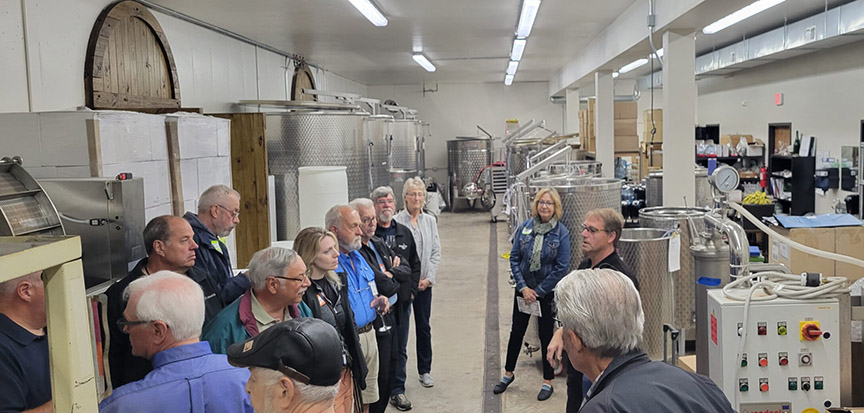
“You can always try to get better and better and the group helps with that,” she said.
Joining a winemaking club and turning the hobby of winemaking into a collaborative and social experience has a multitude of benefits. Cost-saving opportunities, valuable and critical feedback on your wine, educational experiences, and resources to learn and troubleshoot are just the start. Clubs can also offer new life experiences and the opportunity to meet other wine enthusiasts with varying skills and expertise.
To find a winemaking club near you, visit WineMaker’s online directory at winemakermag.com/resource/club-directory (and if you are already a part of a club not listed, let us know!). You can also find a club by asking your local winemaking supply store or local wineries. If you’re having trouble finding a club specific to winemakers in your area, another option is reaching out to local homebrew clubs. In many instances, winemakers (along with cider and meadmakers) are welcome to join a homebrew club, and many homebrewers also make these other beverages.
If all else fails, it may be time to start a club yourself! For advice on starting a club, check out this story discussing that very subject: www.winemakermag.com/technique/starting-a-winemaking-club



